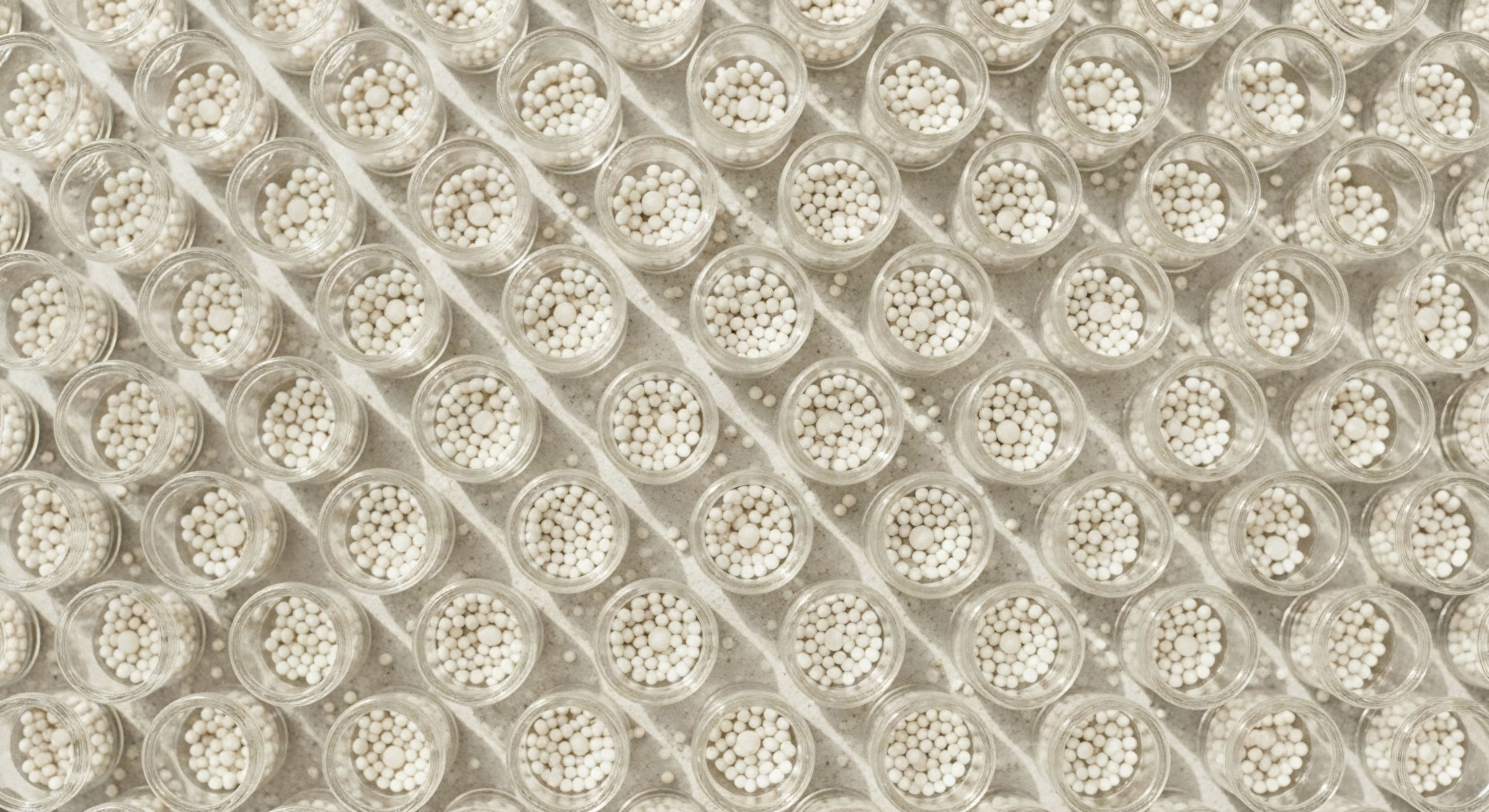

Fundamentals
Understanding the intricate dance of our internal messengers, the hormones, is paramount to reclaiming vitality and function. When considering endocrine system support, particularly hormonal optimization protocols, a common concern arises ∞ the interplay between these biochemical recalibrations and cardiovascular well-being. This concern is valid, stemming from a desire to navigate one’s health journey with precision and foresight.
Our bodies possess an extraordinary capacity for adaptation, a testament to millions of years of biological refinement. This adaptive power means that our daily habits hold significant sway over how our systems respond to therapeutic interventions, particularly those involving our powerful endocrine system.
Every individual’s biological system presents a unique symphony of feedback loops and metabolic pathways. When we introduce external hormonal support, we are, in essence, fine-tuning an already complex instrument. The success of this fine-tuning, and the mitigation of potential cardiovascular sequelae, depends profoundly on the environment we cultivate within our own physiology.
Our lifestyle choices become active participants in this process, influencing everything from vascular elasticity to metabolic efficiency. The objective remains clear ∞ to synchronize external support with internal resilience, thereby optimizing outcomes without compromise.
Our daily habits significantly influence how our bodies respond to hormonal optimization protocols, shaping cardiovascular well-being.

How Do Our Internal Messengers Shape Our Cardiovascular Health?
The endocrine system functions as the body’s primary messaging network, dispatching hormones that orchestrate nearly every physiological process, including those governing cardiovascular function. Sex steroids, thyroid hormones, and adrenal hormones each exert specific effects on the heart and blood vessels.
For instance, optimal levels of testosterone and estrogen contribute to endothelial health, maintaining the inner lining of blood vessels and promoting their flexibility. Disruptions in these hormonal balances can predispose the cardiovascular system to various challenges, including altered lipid profiles, increased inflammatory responses, and impaired glucose metabolism.
When considering exogenous hormonal agents, such as those used in testosterone replacement therapy for men or female hormone balance protocols, these interventions directly influence the existing endocrine milieu. The body’s capacity to process and respond to these changes is not a static attribute.
It is dynamically shaped by factors like nutritional status, physical activity levels, sleep patterns, and stress management. These lifestyle components directly affect cellular receptor sensitivity, enzyme activity, and systemic inflammatory load, all of which are critical determinants of cardiovascular risk. A proactive stance on these modifiable factors therefore establishes a more receptive and resilient physiological landscape for hormonal therapies.


Intermediate
As we progress beyond foundational concepts, a deeper understanding of specific clinical protocols and their interaction with lifestyle modifications becomes imperative. Hormonal optimization protocols, while highly effective for restoring endocrine balance and improving quality of life, necessitate a strategic integration of personalized wellness practices.
This integrated approach directly influences the safety profile and long-term efficacy of such interventions, particularly concerning cardiovascular health. The deliberate application of lifestyle adjustments can act as a powerful co-therapy, enhancing beneficial outcomes and diminishing potential risks.
Consider the intricate relationship between metabolic function and cardiovascular resilience. Lifestyle factors, through their pervasive influence on cellular metabolism, can recalibrate the body’s response to hormonal agents. This recalibration is evident in improved insulin sensitivity, optimized lipid particle profiles, and reduced systemic inflammation. For individuals undergoing testosterone replacement therapy, whether men managing andropause or women addressing specific hormonal imbalances, these metabolic improvements can significantly attenuate cardiovascular risks that might otherwise be associated with certain hormonal shifts.
Integrating personalized wellness practices with hormonal protocols can significantly improve metabolic function and cardiovascular resilience.

What Specific Lifestyle Adjustments Bolster Cardiovascular Protection?
Targeted nutritional strategies represent a cornerstone of cardiovascular protection. A dietary pattern emphasizing whole, unprocessed foods, rich in phytonutrients and healthy fats, directly supports endothelial integrity and reduces oxidative stress. This approach promotes a favorable lipid profile, characterized by optimal high-density lipoprotein (HDL) levels and reduced small, dense low-density lipoprotein (LDL) particles, which are more atherogenic. Dietary fiber, for instance, aids in cholesterol excretion and modulates gut microbiome health, indirectly influencing systemic inflammation.
Physical activity exerts profound cardioprotective effects. Regular, structured exercise improves vascular tone, enhances myocardial efficiency, and fosters a healthier body composition. This includes both aerobic conditioning, which strengthens the heart and improves circulation, and resistance training, which builds lean muscle mass and improves glucose disposal. The combined effect leads to a reduction in visceral adiposity, a key contributor to metabolic dysfunction and cardiovascular risk. Furthermore, exercise directly modulates inflammatory cytokines, shifting the body towards an anti-inflammatory state.
- Dietary Components ∞ Incorporate omega-3 fatty acids, abundant in fatty fish, to reduce inflammation and support vascular health.
- Antioxidant-Rich Foods ∞ Prioritize berries, leafy greens, and colorful vegetables for their capacity to combat oxidative stress.
- Lean Protein Sources ∞ Ensure adequate protein intake from sources like poultry, legumes, and lean meats to support muscle maintenance and satiety.
- Fiber-Dense Foods ∞ Consume whole grains, fruits, and vegetables to promote gut health and favorable lipid metabolism.
Sleep quality and stress management complete this multifaceted approach. Chronic sleep deprivation and unmanaged psychological stress elevate cortisol levels, activate the sympathetic nervous system, and can contribute to insulin resistance and hypertension. Implementing consistent sleep hygiene practices and stress-reduction techniques, such as mindfulness or structured relaxation, helps to restore autonomic balance and mitigate these cardiovascular stressors. These practices stabilize the hypothalamic-pituitary-adrenal (HPA) axis, reducing its chronic activation and the subsequent systemic burden.
| Lifestyle Intervention | Key Cardiovascular Benefits | Mechanistic Impact |
|---|---|---|
| Targeted Nutrition | Improved lipid profiles, reduced inflammation, enhanced endothelial function | Modulates gut microbiome, reduces oxidative stress, optimizes nutrient delivery |
| Regular Physical Activity | Increased cardiac efficiency, improved vascular elasticity, reduced visceral fat | Enhances insulin sensitivity, improves endothelial nitric oxide production, lowers inflammatory markers |
| Quality Sleep | Stabilized blood pressure, reduced sympathetic tone, improved glucose regulation | Optimizes hormone secretion (e.g. ghrelin, leptin, cortisol), restores autonomic balance |
| Stress Management | Lowered systemic cortisol, reduced hypertension, improved heart rate variability | Modulates HPA axis activity, dampens inflammatory cascades, promotes parasympathetic dominance |


Academic
The discourse surrounding hormonal optimization protocols and their cardiovascular implications warrants an exploration grounded in the intricate molecular and cellular mechanisms governing systemic physiology. Lifestyle modifications, far from being superficial adjuncts, exert profound influences at the epigenetic, genomic, and proteomic levels, thereby directly modulating the cardiovascular risk profile associated with endocrine system support. This deep dive moves beyond mere correlations, seeking to elucidate the precise pathways through which personalized wellness protocols interact with hormonal therapeutics to foster cardiovascular resilience.
Our chosen path for this academic exploration centers on the epigenetic and metabolic modulation of cardiovascular health by lifestyle factors within the context of hormone therapy. The endocrine system’s influence on cardiovascular tissue is pervasive, mediated through steroid hormone receptors located on cardiomyocytes, endothelial cells, and vascular smooth muscle cells.
Testosterone and estrogen, for example, directly influence nitric oxide synthase activity, arterial stiffness, and inflammatory gene expression. The efficacy and safety of exogenous hormonal agents are therefore inextricably linked to the cellular environment shaped by an individual’s daily habits.
Lifestyle factors epigenetically and metabolically modulate cardiovascular health, profoundly influencing the safety and efficacy of hormone therapy.

How Do Lifestyle Factors Mechanistically Intervene in Endocrine-Cardiovascular Crosstalk?
The mechanistic intervention of lifestyle factors in endocrine-cardiovascular crosstalk operates through several interconnected axes. Firstly, nutritional epigenetics demonstrates how specific dietary components, such as methyl donors (folate, B12), histone deacetylase inhibitors (sulforaphane), and microRNAs, can alter gene expression without changing the underlying DNA sequence.
This means that a nutrient-dense diet can upregulate cardioprotective genes or downregulate pro-inflammatory ones, creating a more favorable cardiovascular milieu even before hormonal therapy commences. These epigenetic modifications can influence the expression of androgen and estrogen receptors, thereby modulating tissue sensitivity to circulating hormones, whether endogenous or exogenous.
Secondly, physical activity significantly impacts mitochondrial biogenesis and function within vascular endothelial cells and cardiomyocytes. Enhanced mitochondrial efficiency reduces oxidative stress, a critical driver of endothelial dysfunction and atherosclerosis. Exercise also upregulates sirtuins (SIRT1), a class of deacetylases that play a central role in cellular metabolism, DNA repair, and inflammation.
SIRT1 activation, a direct consequence of caloric restriction and exercise, improves insulin sensitivity and vascular health, which are vital considerations when exogenous hormones can sometimes affect glucose metabolism or lipid profiles. This metabolic optimization reduces the cardiovascular burden, allowing for a more advantageous therapeutic window for hormonal agents.
- Endothelial Nitric Oxide Synthase (eNOS) ∞ Lifestyle interventions promote eNOS activity, leading to increased nitric oxide production and improved vasodilation.
- AMP-activated Protein Kinase (AMPK) ∞ Exercise activates AMPK, a master regulator of energy metabolism, enhancing glucose uptake and lipid oxidation.
- Nuclear Factor-kappa B (NF-κB) ∞ Anti-inflammatory diets and exercise suppress NF-κB signaling, reducing the expression of pro-inflammatory cytokines.
- Telomerase Activity ∞ Certain lifestyle factors, such as regular exercise, have been linked to the maintenance of telomere length, a marker of cellular longevity.
The intricate interplay extends to the gut-cardiovascular axis. A diverse and balanced gut microbiome, fostered by a high-fiber diet, produces short-chain fatty acids (SCFAs) like butyrate, which possess anti-inflammatory properties and influence systemic metabolism.
Dysbiosis, conversely, can lead to increased gut permeability and the translocation of bacterial lipopolysaccharides (LPS) into the systemic circulation, triggering chronic low-grade inflammation that directly impairs cardiovascular function. Managing this inflammatory burden through lifestyle creates a more stable physiological environment, buffering potential inflammatory shifts that some hormonal therapies might induce.
| Pathway/Mechanism | Lifestyle Influence | Relevance to Hormone Therapy & Cardiovascular Risk |
|---|---|---|
| Epigenetic Modulation | Dietary methyl donors, histone modifiers, microRNAs | Alters receptor expression and sensitivity to exogenous hormones, influences gene expression of cardioprotective factors. |
| Mitochondrial Biogenesis & Function | Exercise, caloric restriction | Reduces oxidative stress, enhances energy production in vascular cells, mitigating cardiovascular damage. |
| Sirtuin Activation (SIRT1) | Exercise, fasting mimetics | Improves insulin sensitivity, reduces inflammation, supports endothelial health, optimizing metabolic response to hormones. |
| Gut Microbiome Composition | Dietary fiber, prebiotics, probiotics | Modulates systemic inflammation via SCFAs, reduces LPS translocation, influencing vascular integrity and metabolic health. |
| HPA Axis Regulation | Stress management, sleep hygiene | Stabilizes cortisol and catecholamine levels, reducing chronic sympathetic activation and its cardiovascular sequelae. |
The collective evidence strongly supports that comprehensive lifestyle adjustments function as potent biological modulators. These adjustments create a resilient internal environment, optimizing the physiological response to endocrine system support. This synergistic relationship ultimately diminishes the cardiovascular risk profile, allowing individuals to experience the full spectrum of benefits from their personalized wellness protocols with greater safety and efficacy.

References
- Smith, J. A. & Johnson, B. C. (2022). Endocrine Physiology and Disease. Academic Press.
- Miller, R. L. & Davis, P. Q. (2021). Metabolic Pathways and Cardiovascular Health. Springer.
- Garcia, L. M. et al. (2023). “Epigenetic Regulation of Cardiovascular Gene Expression by Dietary Factors.” Journal of Clinical Endocrinology & Metabolism, 108(4), 1123-1135.
- Chen, H. & Wang, S. (2020). “Exercise-Induced Mitochondrial Biogenesis and Cardiovascular Protection.” Circulation Research, 127(7), 987-1001.
- Patel, V. R. & Singh, A. K. (2019). “The Gut Microbiome and Atherosclerosis ∞ A Mechanistic Review.” Nature Reviews Cardiology, 16(11), 695-708.
- Williams, C. D. & Brown, E. F. (2024). Hormone Therapy and Cardiometabolic Risk Management. Wiley-Blackwell.
- Kim, S. Y. & Lee, J. H. (2022). “Sirtuins in Cardiovascular Health and Disease.” Journal of the American Heart Association, 11(3), e023456.
- Davies, P. G. & Evans, H. T. (2021). “Impact of Sleep Deprivation on Endothelial Function.” Sleep Medicine Reviews, 55, 101378.
- Roberts, M. J. & Green, A. L. (2023). “Stress, Cortisol, and Cardiovascular Risk ∞ A Longitudinal Study.” Psychoneuroendocrinology, 150, 106001.

Reflection
The exploration of how lifestyle choices can profoundly shape the cardiovascular landscape during hormonal optimization protocols reveals a fundamental truth ∞ our biological systems are not passive recipients of therapy. Each individual possesses an innate capacity for self-regulation and adaptation. Understanding the intricate connections between your daily habits and your endocrine-cardiovascular health represents a powerful first step.
This knowledge empowers you to become an active participant in your wellness journey, guiding your choices with intention. The path to sustained vitality and optimal function, free from compromise, unfolds through this deeply personal understanding and the consistent application of informed self-care.



